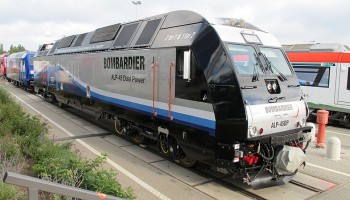Thomas Bimer, a former business area manager at Bombardier in Sweden, will now face trial for his role in the allegedly corrupt tender that Bombardier won in Azerbaijan in 2013.
Prosecutors argue the US$350 million contract to install signalling systems for a section of Azeri railway involved Bombardier paying a $100 million bribe to at least one mid-ranking railway executive.
"[Bimer] was the head of the department in charge of this project. We believe that he was aware that Bombardier colluded with the customer in Azerbaijan," Prosecutor Staffan Edlund, of the National Anti-Corruption Unit, told OCCRP.
The allegedly bribed Azeri railway executive also represented a local business, Trans-Signal-Rabita (TSR), which won the tender together with the Swedish company. TSR and Bombardier Sweden rigged the tender so that Bombardier Sweden would win it, according to the indictment now being filed in the Stockholm District Court.
Both Mr Bimer and Bombardier deny any wrongdoing, as does the Azeri railway executive, says the prosecutor, although Swedish investigators have not been able to question the latter.
Furthermore, it is likely that there were other employees at the railway authority in Azerbaijan who received a cut of the payments.
”Based on our investigation, I think it is safe to say that others were involved in this. But to prove bribery, we must show that someone has benefited, and that is the case with this one person, but I don’t have to show in a court that there were more beneficiaries,” Prosecutor Edlund told OCCRP.
The Prosecutor did not want to speculate how high up in the hierarchy the alleged bribes went in Azerbaijan, a country infamous for corruption at the very top of society.
When asked for assistance – the questioning of suspects, for instance – Azeri authorities provided ”little of substance,” Edlund claimed, although he did get some documents from them.
The prosecutor notes that Swedish Bombardier’s former CEO was previously also suspected of bribery, along with several others, yet the insufficiency of evidence means there is not enough to prove any guilt in his case.
One potential fear for the prosecution may be a precedent, however. In 2017, a Russian sales manager involved in the same scandal at the Swedish company was acquitted of bribery by the Stockholm District Court. He then moved back to Russia and failed to appear when the case resurfaced at the appeals court in February 2020.
Prosecutor Edlund, though, is not deterred.
"Our view is that there has been a misinterpretation of the bribery legislation in that judgment,” he said.
His resolve will surely have been strengthened by news that the World Bank, which funded 85% of the Azeri project in question, reportedly wrote to Bombardier’s then-Montreal headquarters in 2018 to accuse the company of bribery.
Bombardier Sweden has since been sold to the French company Alstom, but it still risks being excluded from any future World Bank-financed projects. The financial institution has reportedly not made any final decisions.
That being said, Edlund had not seen any evidence that top managers in Canada were aware of the actions of the local partner in the Azeri case. He nonetheless ranks the alleged bribe as the second biggest to have led to an indictment in Sweden, just behind the infamous case of telecoms group Telia in Uzbekistan.






